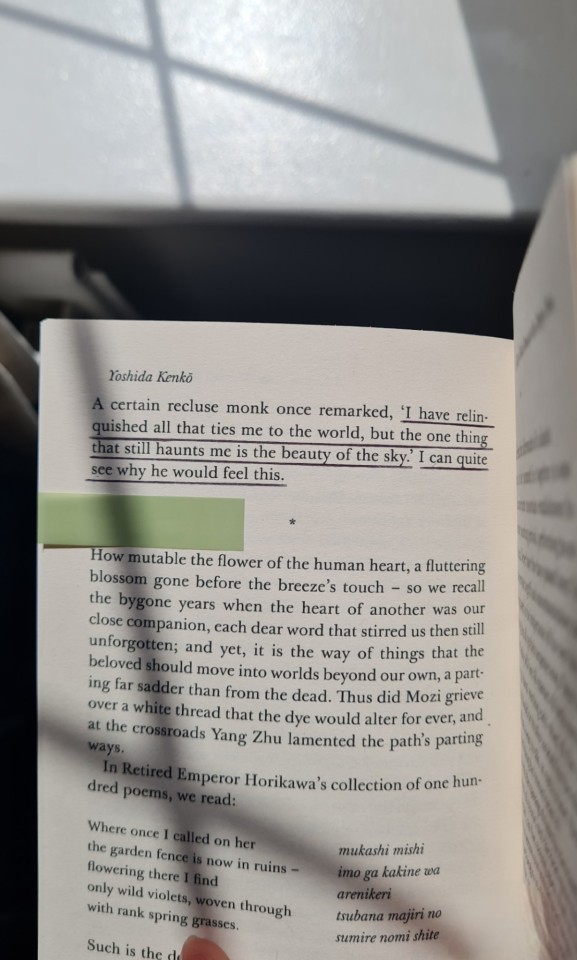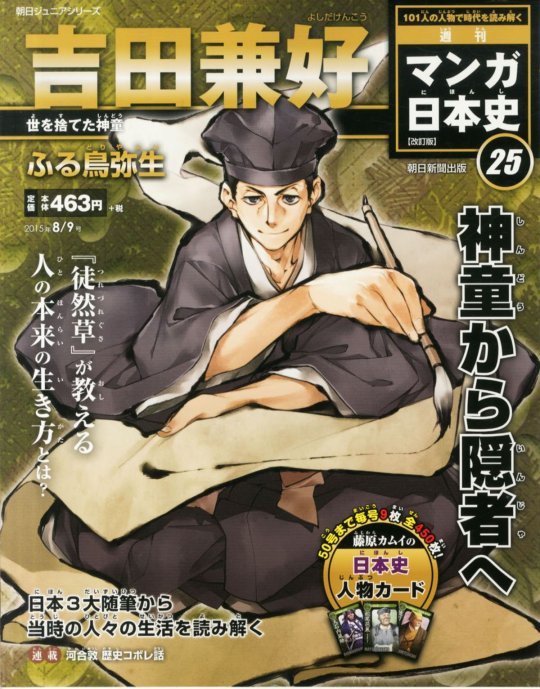#yoshida kenko
Explore tagged Tumblr posts
Text


first read of may — a cup of sake beneath the cherry trees by yoshida kenkō
moonlight, sake, spring blossom, idle moments, a woman's hair. 'a cup of sake beneath the cherry trees' is a collection of fragments from the journal of a 13th-century monk, as he reflects on the pleasures of life and its passing moments. i think there's something in here for everyone to admire, with its reflective themes, philosophical undertones, and beautiful writing and imagery.
i definitely recommend!! 🌱
#3.5 stars#classics#book review#review#literature aesthetics#books#book#bookish#bookblr#bookworm#bookstagram#dark academia#booklover#books and libraries#reading log#a cup of sake beneath the cherry trees#yoshida kenko#studyblr#study space#study tips#quotes#annotated bibliography#book log
650 notes
·
View notes
Text
It is a most wonderful comfort to sit alone beneath a lamp, book spread before you, and commune with someone from the past whom you have never met.
Yoshida Kenko

20 notes
·
View notes
Text
On mornings when my thoughts turn to the 'white retreating waves' of this transient life, I gaze out to the boats that ply the river at Okanoya, and savour as my own the feelings of the old poet Novice Mansei. On evenings when the wind rustles in the leaves of the katsura trees, I cast my thoughts to Xunyang Inlet, and pluck my biwa in the way of Tsunenobu. And if the mood is still upon me, often I play to the sough of wind in the pines the piece called 'Autumn Wind Music', or 'Flowing Spring' to the murmur of the running water. My skill is poor, but then I do not aim to please the ears of others. I play alone, I sing alone, simply for my own fulfillment.'
Yoshida Kenko, Hojoki, trans. Meredith McKinney
#hojoki#kenko yoshida#yoshida kenko#when i read this part it reminded me of whenever someone found out i play banjo and they'd ask ''oh are you in a band? do you play gigs?''#i just entertain myself usually#that being said i do want to get some songs to a point where maybe i can jam with some friends or go to an open mic even
2 notes
·
View notes
Text

It's cruel to make people suffer and drive them to break the law, then treat the poor creatures as criminals.
— Yoshida Kenkō, A Cup of Sake Beneath the Cherry Trees
1 note
·
View note
Text
A Cup of Sake Beneath the Cherry Trees
By Yoshida Kenko

General Information
Edition:
Translated by Meredith McKinney under Pinguin Books as a Pinguin Classics.
"Selection taken from Essays in Idleness (Tsurezuregusa), which was probably written around 1329-31."
Author:
Urabe Kenkō, also known as Yoshida Kenkō, or simply Kenkō, was a Japanese author and Buddhist monk. He was allegedly born in 1283 and died in 1352 in Japan. His most famous work is Tsurezuregusa, one of the most studied works of medieval Japanese literature.
Short Synopsis (via goodreads):
'It is a most wonderful comfort to sit alone beneath a lamp, book spread before you, and commune with someone from the past whom you have never met...' Moonlight, sake, spring blossom, idle moments, a woman's hair - these exquisite reflections on life's fleeting pleasures by a thirteenth-century Japanese monk are delicately attuned to nature and the senses.
Page count:
51 paper pages.
Trigger warnings:
Misogyny, alcohol consumption, social anxiety.

Initial thoughts post-read:
This work serves as a powerful reminder that not all creations of a writer necessitate publication. Were they the next Sokratis or Plato? Certainly not, and Kenko himself knew it. He explicitly stated that these writings were intended solely for his own consumption. So why, then, override his wishes and publish them? While certain passages may spark conversation, do they offer a singular thought that could only be derived from his mind? Doubtful.
You'll find some solid life advice here and the thoughts of someone who's had the luxury to really mull over life's big questions through deep introspection. Yet, beyond that, there appears to be little else. The text reflects the contemplations of someone who has had the time and privilege to ponder the essence of their existence. But is there profundity here beyond personal reflection? It's hard to say. This text is more about personal reflection than groundbreaking insight.

Quotes:
[...] but such a friend is hard to find, and instead you sit there doing your best to fit in with whatever the other is saying, feeling deeply alone. (page 7)
After all, things thought but left unsaid only fester inside you. So, I let my brush run on like this for my own foolish solace; these pages deserve to be torn up and discarded, after all, and are not something others will ever see. (page 10)
We long to leave a name for our exceptional wisdom and sensibility - but when you really think about it, desire for a good reputation is merely revelling in the praise of others. (page 16)
In general, I find that reasonably sensitive and intelligent people will pass their whole life without taking the step they know they should. (page 19)
'A beginner should not hold two arrows,' his teacher told him. 'You will be careless with the first, knowing you have a second. You must always be determined to hit the target with the single arrow you shoot, and have no thought beyond this.' (page 25)
It is because they have no fear of death that people fail to enjoy life - no, not that they don't fear it, but rather they forget its nearness. (page 26)
'While he's up there among the trecherous branches I need not say a word - his fear is enough to guide him. It's in the easy places that mistakes will always occur.' (page 28)
There is so much talking when people get together. It is exhausting, disturbs the peace of mind and wastes time better spent on other things. (page 39)
#aesthetic#book classics#book commentary#book criticism#book recommendations#books#book review#bookblr#books & libraries#books and reading#yoshida kenko#a cup of sake beneath the cherry trees#pinguin books#pinguin classics#N°11#book quotes#book blog#bookish
0 notes
Text

Weekly Manga Nihonji (週刊マンガ日本史) / Asahi Shimbun Publications (朝日新聞出版) / 9th Aug 2015 issue (Featured historical figure: Yoshida Kenkō)
#educational manga#japanese history#yoshida kenkō#kenko#asahi shimbun#週刊マンガ日本史#朝日新聞出版#2010s manga#issue month: august
0 notes
Text

“To sit alone in the lamplight, with a book spread out before you, and hold intimate converse with men of unseen sensations— such is a pleasure beyond compare.”
Yoshida Kenko, Essays in Idleness 1340
Art: The Tale of Genji - Wakana by Yoshio Okada (1939-2021)
236 notes
·
View notes
Text
2024 book wrapped 🎀 for anyone who cares.
letters to milena (dnf) | franz kafka on earth we're briefly gorgeous | ocean vuong no longer human | osamu dazai the ball jar | sylvia plath living dolls | natasha walker letters to milena (fin) | franz kafka all the lovers in the night | mieko kawakami the waves | virginia woolf the setting sun | osamu dazai the symposium | plato moshi moshi | banana yoshimoto breasts and eggs | mieko kawakami almond | won-pyung sohn south of the boarder, west of the sun | haruki murakami letter to his father | franz kafka all about love : new visions (reread 2023) | bell hooks the picture of dorian grey | oscar wilde mild vertigo | mieko kanai child of fortune | yuko tsushima a cup of sake beneath cherry trees | yoshida kenko dead end memories | banana yoshimoto mornings with my cat mii | mayumi inaba
favourite author : mieko kawakami favourite book : moshi moshi | banana yoshimoto
least favourite author : haruki murakami least favourite book : south of the boarder, west of the sun | haruki murakami
goals for 2025, 40 books,
to be reread; on earth we're briefly gorgeous, the waves.
26 notes
·
View notes
Text
今日の名言 #酒 20241120
名言:
「百薬の長とはいえど、よろずの病は酒よりこそ起れ。」
吉田兼好(歌人・随筆家)
英訳:
"Though sake is called the best of medicines, many illnesses arise from it."
Kenko Yoshida (Poet and Essayist)
ギャル風:
「酒ってさ、最強のクスリとか言われてるけど、結局、病気のもとは酒じゃん?ウケるー!」
ケンコー💕
1 note
·
View note
Text

"En todas las cosas la uniformidad es un defecto. Es interesante dejar algo incompleto y por terminar; así se tendrá sensación de que mediante la imperfección se prolonga la vida de los seres."
Yoshida Kenko.
0 notes
Text
It is a most wonderful comfort to sit alone beneath a lamp, book spread before you, and commune with someone from the past whom you have never met.
Yoshida Kenko

art by Ada Thilen
53 notes
·
View notes
Text
Le chagrin des choses
« Mono no aware (物の哀れ) est un concept esthétique et spirituel japonais, pouvant être traduit comme « l'empathie envers les choses » ou « la sensibilité pour l'éphémère », utilisée par Motoori Norinaga dans son interprétation du Genji monogatari. »
« ll sert à désigner une sensation subtile entre la « poignance » (setsunai) et le « sentiment profond », l’attachement à la beauté du transitoire, à ce qui meurt, tout comme à l’étrange beauté des objets qui nous survivent. On le retrouve dans les sons des cloches du temple de Gion. »
« L'expression mono no aware est composée du mot mono (物), signifiant « chose », et de l'interjection aware (哀れ). Couramment utilisée à l'époque Heian, on pourrait traduire cette interjection par « ah ! ». Elle témoigne d'une surprise mesurée, contrôlée.
Ainsi cette expression articulée autour de la particule japonaise の signifie très littéralement « l'aspect ah ! des choses ». Cependant, pour mieux comprendre l'expression, on peut la rapprocher d'équivalents européens, par exemple « lacrimae rerum » ou « memento mori ».
Ivan Morris, spécialiste du Dit de Genji, estime dans The World of The Shining Prince qu'on peut comprendre une différence fondamentale entre la culture japonaise et la culture européenne en comparant les expressions mono no aware et memento mori, qui reflètent chacune deux paradigmes qui ne mettent pas l'accent sur les mêmes réalités. La plus grande différence est peut-être celle de l'emphase. Le christianisme, tout en nous rappelant l'impermanence et la vanité des choses de ce monde, ne s'étend généralement pas sur le thème et préfère mettre l'accent sur la dichotomie entre péché et vertu. Le bouddhisme japonais, au contraire, s'est préoccupé de la nature fuyante du monde phénoménal.
Tandis que mono no aware se pose dans la description résignée et la contemplation, memento mori pousse à l'action, et donc au carpe diem. »
« Si l’homme ne devait jamais s’effacer comme les rosées d’Adashino, jamais s’évanouir comme la fumée sur Toribeyama, comme les choses perdraient leur pouvoir de nous émouvoir ! Ce qu’il y a de plus précieux dans la vie, c’est son incertitude. » Yoshida Kenko
« Les étoiles brillent et clignotent. Nous sommes tous des invités de passage, un sourire et un nom. » Ken Liu, Mono No Aware
Sources : Wikipedia, Umanz

« Et une vie secrète commence dans les choses, ce que tu croyais mort et sans vie révèle une vie secrète et une intention impitoyable. » Carl Jung, Livre Rouge
1 note
·
View note
Text
In all things, perfect regularity is tasteless. Something left not quite finished is very appealing, a gesture towards the future. Someone told me that even in the construction of the imperial palace, some part is always left uncompleted. In the Buddhist scriptures and other works written by the great men of old there are also a number of missing sections.
Yoshida Kenko. 82, Essays in Idleness [Tsurezuregusa], trans. Meredith McKinney
5 notes
·
View notes
Text

Je suis le plus heureux quand je n'ai rien à faire.
Yoshida Kenko, poète japonais
0 notes
Text
It is a most wonderful comfort to sit alone beneath a lamp, book spread before you, and commune with someone from the past whom you have never met.
Yoshida Kenko
0 notes
Text
“It is a most wonderful comfort to sit alone beneath a lamp, book spread before you, and commune with someone from the past whom you have never met.”
—Yoshida Kenko
1 note
·
View note